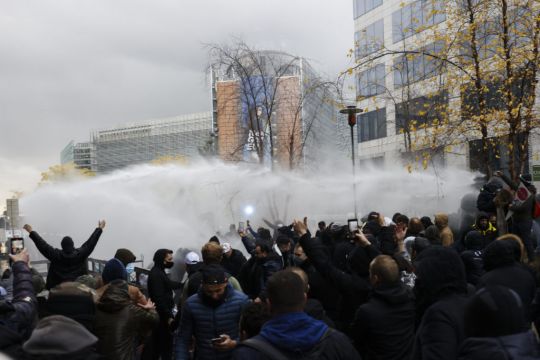Authorities across Europe were pleading for patience, calm and a willingness to get vaccinated as infections spike upwards again and in face of demonstrations protesting against fresh Covid-19 measures in recent days.
And to those who abused the protests to foment violence, Dutch prime minister Mark Rutte called them “idiots”.
Protest marches from Zagreb to Rome and from Vienna to Brussels and Rotterdam, bringing tens of thousands people on to the streets, all shared the message from coronavirus-weary crowds that they had had enough.

“Not able to work where you want work, to be where you want to be. That’s not what we stand for, that’s not freedom,” Eveline Denayer, who was at Sunday’s march in Brussels which drew a crowd of more than 35,000, said.
“We live in Western Europe and we just want to be free, how we were before.”
Government leaders and European Union officials all made clear on Monday that a return to bygone days was still out of the question and that the violence at some of the marches was counterproductive.
But much of the discontent is targeted at politicians who had promised that vaccinations would bring freedom. With the Delta variant meaning contagion remains rampant, EU governments are being forced to reimpose constraints and – in some countries – slap tougher restrictions on unvaccinated people.
“The rising numbers are unfortunately fuelling vaccine hesitancy, and we all need to take a firm stand against this,” EU health commissioner Stella Kyriakides said.
“But now we are facing a pandemic mainly driven by the unvaccinated.”

Breakthrough infections and deaths among the vaccinated happened, but at far lower rates, according to officials.
Mr Rutte condemned rioters in Rotterdam and across the Netherlands after coronavirus protests there and in Brussels descended into violence amid simmering anger at lockdown measures being put into place in an attempt to rein in soaring rates of infection.
Late on Friday, police in Rotterdam used live fire to disperse rioters, and four people suffered gunshot wounds. Altogether in both countries almost 100 people were detained.
“I realise that there are a lot of tensions in society because we have been dealing with all the misery of coronavirus for so long,” Mr Rutte said.
But he stressed that the rioters were something completely different, producing “a pure explosion of violence directed against our police, against our firefighters, against ambulance drivers”.
The Brussels protest march also turned ugly, with rioters pelting police, who then used tear gas and water cannons to break up the crowds.
“Our goal today is to fight against the virus. Please, let us not get incited by a small group which would turn it into a fight against one another,” Belgian prime minister Alexander De Croo said.
The protests come as a fourth wave of infections is locking down Austrians and forcing renewed restraints in many European nations on everything from working in the office to drinking at bars.
The Dutch violence came a week into a new partial lockdown in the Netherlands and after an announcement that the government was banning fireworks on New Year’s Eve in an effort to ease the strain on hospital emergency rooms. In riots across the country, youths threw fireworks at police officers.
“Of course, we see that the constraints with which we have been living for almost two years can be tiresome,” EU spokeswoman Dana Spinant said.
“But it’s important from a community level to stick together and to follow those restrictions because that’s the way out of the pandemic.”
The EU pointed out that scientific evidence showed that increased vaccinations would contain the crisis and avoid more deaths.
“You know the three words very well – vaccinate, vaccinate, vaccinate,” European Commission spokesman Stefan De Keersmaecker said.







